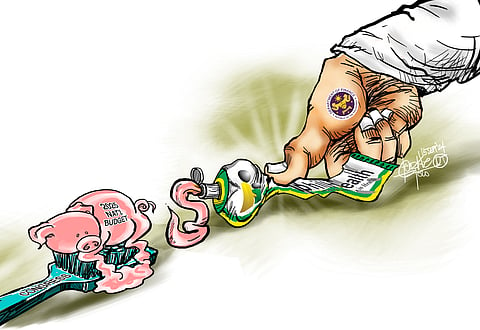
- NEWS
- the EDIT
- COMMENTARY
- BUSINESS
- LIFE
- SHOW
- ACTION
- GLOBAL GOALS
- SNAPS
- DYARYO TIRADA
- MORE

A former deputy governor of the Bangko Sentral ng Pilipinas (BSP) has joined the snowballing opposition to the Department of Finance’s (DoF) siphoning of P89.9 billion in Philippine Health Insurance Corp. (PhilHealth) funds labeled as excess and its transfer to the National Treasury.
Diwa Guinigundo, now an analyst at think tank GlobalSource, considers the practice “bad fiscal management.”
Academic and health worker groups have filed a petition with the Supreme Court to halt the transfer of the funds that will be used supposedly to fund unprogrammed items in the national budget that were bumped off from several agencies in the 2024 budget to make way for pork barrel insertions.
PhilHealth is scheduled before October to remit another P30 billion based on a DoF directive. In all, P60 billion in excess funds would have been transferred by then to the General Fund.
“For PhilHealth, the fundamental issue is whether the P89.9 billion to be sequestered really constitutes excess or unused funds. When decent health care remains inaccessible to many Filipinos, even the P500 billion in PhilHealth’s reserve fund falls short of its requirements to deliver on the universal health care law,” according to Guinigundo.
“Why, it is no less unconscionable for the PhilHealth leadership, then and now, to even talk about profitable operations and reserve funds. Reserve funds are supposed to be used to increase benefits or reduce the amount of member contributions pursuant to the law,” the former BSP executive said.
A provision in the 2024 General Appropriations Act allowed the DoF to sweep up the idle funds of agencies, which resulted in PhilHealth being told to surrender its “excess funds” to the Bureau of the Treasury (BTr).
PhilHealth remitted P20 billion on 10 May and P10 billion on 21 August.
Finance Secretary Ralph G. Recto indicated the need for the government to mobilize unused funds to finance key programs without incurring additional debt.
Guinigundo said that resorting to extracting PhilHealth’s resources is not advisable since “public health is a matter of life and death, while infrastructure and other social services can wait another day.”
He said that Republic Act 11223, or the Universal Health Care Act, specifies that PhilHealth’s reserves should be used solely to increase benefit packages or reduce member contributions.
The shakedown of PhilHealth is unconscionable considering that around 44 percent of healthcare spending is out of pocket, based on the estimates of health organizations.
For Guinigundo, “it is crystal clear that the optimal use of public funds is not the issue here. It is PhilHealth’s failure to use its funds to provide health coverage to millions of Filipinos; it is PhilHealth’s incompetence in broadening public health benefits.”
Another point raised is that PhilHealth still owes government hospitals P14.8 billion, which puts forward questions on the so-called idle funds.
“With many priority projects kicked out of the programmed appropriations and on to unprogrammed appropriations, but with higher allocations for the Office of the President, Senate, House of Representatives,and the Department of Public Works and Highways, the government is now scraping the bottom of the financing barrel,” Guinigundo said.
Groups opposed to the raid on the PhilHealth coffers said that more than P200 billion in key government projects were displaced during the bicameral conference committee that came up with the final version of the 2024 budget.
Instead, the pet projects of the members of the House of Representatives and the Senate were given priority while the items set aside were placed in the unprogrammed portion of the budget that the government would have to scrounge around for funding.
Bad fiscal management marked the 2024 budget given the priority placed on the pork barrel which the Supreme Court had already ruled was unconstitutional in a landmark 2014 decision.
“With the fiscal deficit continuing to be substantial at over P1 trillion every year since the pandemic, and the option to impose new or higher taxes ruled out, the only option available is to borrow more from both global and domestic capital markets,” Guinugundo said.
The public debt, he said, is at P15.69 trillion which is near 61 percent of the gross domestic product.
The gist of it is the DoF move to squeeze funds from PhilHealth is a waste of public money that is a matter of life and death for Filipinos deprived of basic healthcare.
